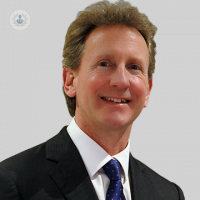How your thyroid gland works – and what can go wrong
Autore:How does the thyroid gland work, what does it mean to have an under- or over-active thyroid, and can this be related to thyroid cancer? We asked leading consultant ENT surgeon Mr Brian Fish, a specialist in treating neck lumps and thyroid disorders.

What is the thyroid?
The thyroid gland is an organ in the neck. It produces hormones which are then secreted into the blood and delivered around the body.
The hormones it secretes are triiodothyronine (T3) and thyroxine (T4). These hormones affect how most of the cells that make up the body function. They control the body's metabolism (the speed at which it works) and their levels can be measured with a blood test.
The gland itself is found quite low down in the neck and can be described as “butterfly-shaped”. The body (or isthmus) lies on the front of the windpipe, and the “wings” wrap around the windpipe on either side.
The thyroid begins life at the back of the tongue and migrates down into the neck as we develop before birth. This means that occasionally our thyroid can be found in the back of the tongue, or in a swelling down the front of the neck.
What can go wrong with the thyroid gland?
The thyroid gland can go wrong in two ways:
- functionally – by becoming over or under active
- structurally – it can increase in size (called a goitre) or become nodular.
These two problems are not necessarily related. You can have a normal-looking gland which is over or under-active, or a very large or nodular gland which functions normally.
Nodules or lumps in the thyroid are very common and may be present in about half of the population. The vast majority of thyroid lumps are benign. However, a small proportion will be cancerous – so it is important to investigate any thyroid swellings.
How are thyroid lumps investigated?
With most benign or cancerous thyroid swellings, the function of the thyroid will be normal so any blood tests will be normal. Occasionally you can get an overactive nodule which will cause the level of thyroid hormones in the blood to rise.
Therefore the main investigation of a thyroid swelling is an ultrasound scan. This will show:
- the size of the gland
- whether there is one nodule or more
- whether the nodule is solid or cystic (fluid-filled)
- whether there are any features to suggest that it is cancerous
- whether there are any associated enlarged neck glands (lymph nodes).
If there is any doubt as to whether a thyroid nodule is cancerous then a needle test will be taken to remove some of the cells for analysis under the microscope.
Other tests may be undertaken, such as:
- a CT scan if there is suspicion that an enlarged thyroid is extending down into the chest
- an MRI scan if there is suspicion that it is growing into the windpipe
- a nuclear medicine scan if the gland is overactive
This is the first of a two part series on the thyroid gland. The next will look at how thyroid lumps are treated and when surgery is considered. To book a consultation with Mr Brian Fish, click here .


